We use cookies to ensure that we give you the best experience on our website. If you continue to use this site we will assume that you are happy with it
Do Pending Court Cases Show Up on a Background Check? (Check Now)
 Written by Background Check Repair
Written by Background Check Repair
Background Checks | June 6, 2024
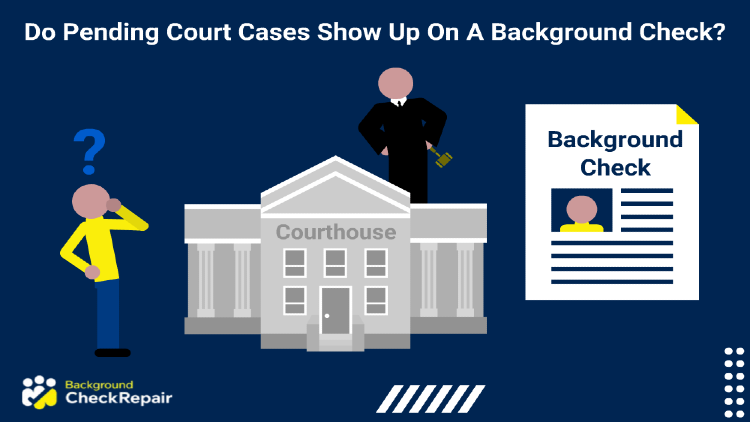
Table of Contents
If you are applying for a new job, an apartment, or other opportunities, you may be asking yourself, “do pending court cases show up on a background check?” You may also be wondering if this potential charge will scuttle your opportunities and need to know how to check right now.
The bad news is that with pending court cases, each state is different concerning what is considered public information. While some background checks in certain states will show pending cases, others do not, and are required to wait for the court decision to be finalized before the info is updated on a criminal history.
Even if pending court cases or criminal charges are visible, this does not always mean that this information can legally be used against you as a job applicant. Luckily, there are federal regulations, and often state laws, to protect job applicants when an employer asks for consent to conduct a background check.
However, depending on which state you live in, and what criminal charge you have pending, it is important to be aware of what will come up on a background check, before consenting. This guide explains the answers to the question, “do pending court cases show up on a background check,” and outlines options on how you can check now, to see if your case will appear.
What Does a Background Check and Criminal History Background Check Show About Court Cases Coming Up?
Remember, a pending charge does not mean that you have been convicted or found guilty of a crime. Therefore, you still have some protections for when pending charges show up on background checks.
There are a few different types of background checks, which reveal different details. Two main types are Level 1 and Level 2 Background Checks. And, either of these options can be run before you consent to a check.
Level 2 background checks are more intense and cover more than Level 1 checks. This intensified check typically involves submitting your fingerprints, so that you can be screened in national criminal databases, such as the FBI database. More specifically, Level 2 background checks can reveal felony convictions, misdemeanor convictions, sex offenses, arrests in other states, and any pending criminal cases which have not yet concluded. Level 1 checks on the other hand may only check local, county, or state records, which could also potentially include pending charges, but only those that fall within that jurisdiction.
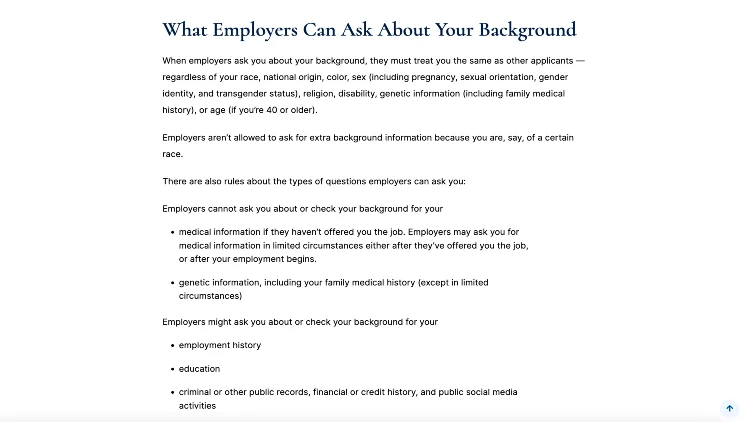
(Image: Federal Trade Commission6)
The type of charge can also determine whether or not a pending court case will show up on a background check. For instance, county criminal charges may show up more quickly than state criminal charges. This is because most criminal charges occur at the local or county level, and are therefore entered at the county courthouse level, which is more instantaneous. Since state criminal charges are fewer in number, they are entered into state databases less frequently, meaning it could take weeks or even months for state pending charges to show up on a background check.1
However, in many states, employers are still allowed to consider the possibility of your crime if you are convicted, but only if it is relevant to the context of the job. For example, if you are being considered to work as a day care employee, the employer is allowed to dismiss your application if you have pending charges of sexual assault.1
Fortunately, you can find out exactly what will appear on your background check by learning ways to perform a records check on yourself. By running the check first, using a reputable provider that can check all court databases, you can know exactly what information will show up.
Will an Employer See If I am Out on Bail on a Background Check? (What Info Will Come Up?)
The U.S. Equal Employment Opportunity Commission (EEOC) states that an arrest is not evidence that a prospective employee has engaged in criminal conduct, since getting arrested does not always lead to a criminal charge. Therefore, federal law provides some protection for job candidates and individuals in general, during background checks, employment screenings, and any other criminal history checks.5
The Fair Credit Reporting Act (FCRA) also protects job applicants concerning criminal history, background check protocol, and more. If your state does not have specific laws to protect your rights, there is still federal law to help you.4
If an employer asks about arrests, they must be able to justify why that question is related to the job. It is against federal law to disqualify a person of one race for an arrest, if not disqualifying a person of a different race with a similar criminal record or arrest record.
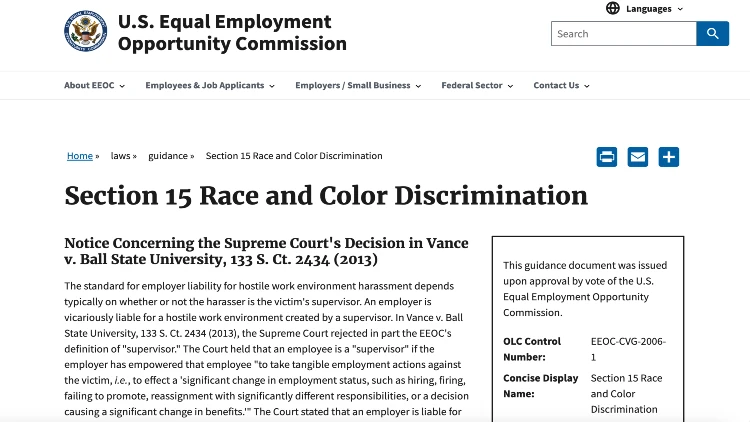
(Image: U.S. Equal Employment Opportunity Commission7)
For instance, the Fair Credit Reporting Act (FCRA) requires employers to get your permission before conducting a background check. While denying this request may disqualify you from getting the job, consent is always required when obtaining background checks for professional purposes. The FCRA exists to protect job candidates for a pre-employment check, background checks for a promotion, and other employment decisions. If you believe your rights have been violated, you should contact attorneys who specialize in employment law.
When asking, do pending court cases show up on a background check, it is important to pay attention to the applicable state laws where you live.
Which States Have a Law To Not Show Pending Criminal Charges on a Criminal Background Check?
While every American has some US federal protections concerning pending criminal charges, some states have additional laws to provide further privacy protections. That being said, all states must uphold federal regulations in addition to any relevant state laws.
Many states limit employers or others conducting a background check, in terms of seeing pending criminal charges. For example, in some states, you cannot ask a job applicant about an arrest that did not lead to a conviction, unless the court case is still pending. Furthermore, some states only allow employers to ask about pending charges or arrests if the crime directly relates to the job at hand, or involves vulnerable populations.
In California, there is a new “ban the box law” created by the Fair Chance Act, that disallows companies with more than five people to put a question on an initial job application asking about criminal history. It refers to the “box” that applicants have to check if they have been convicted, or even accused, of a crime. It is intended to reduce barriers to employment for individuals with criminal records.
This California law, enacted in 2018, also states that employers are not allowed to ask applicants about arrests that did not lead to convictions, but can ask about pending court cases and use their discretion on whether or not this disqualifies the person from the position. For instance, if the applicant has been released on bail, they may have to provide an explanation. However, in general, employers cannot ask applicants about their criminal records in California until later stages of the application process, and not on any initial job application documents. This avoids discrimination and helps employers move forward with the best candidates for the job, without bias based on criminal record or pending criminal charges.2
Similarly, in Maryland, state law disallows employers to ask about any convictions that are not related to the nature of the job. For instance, if you have a criminal record related to possession of drugs, but are applying for a work-at-home data entry job, your employer cannot ask about your cases. This applies whether the court case is pending or if you were already convicted in the court of law.2
Which States Will Only Show Official Criminal Records? (Convictions)
If you’re wondering do pending court cases show up on a background check in Massachusetts, know that an employer cannot ask you about an arrest, criminal case, or detention that did not end in a conviction, and doing so is illegal according to state courts. While employers are allowed to ask about misdemeanor and felony convictions, they cannot ask about any pending charges as well as those which did not end in convictions. If a pending county or state court case shows up on a check, the employer cannot ask about it.
In Kentucky, a criminal background check cannot show pending charges. This does not only apply for employers and job candidates living in Kentucky but also to any third-party companies conducting background checks. This prevents anyone from gaining access to information surrounding pending criminal charges in Kentucky.3 Similarly, court records that have been expunged or purged by the county in Kentucky will also not show up on background checks.
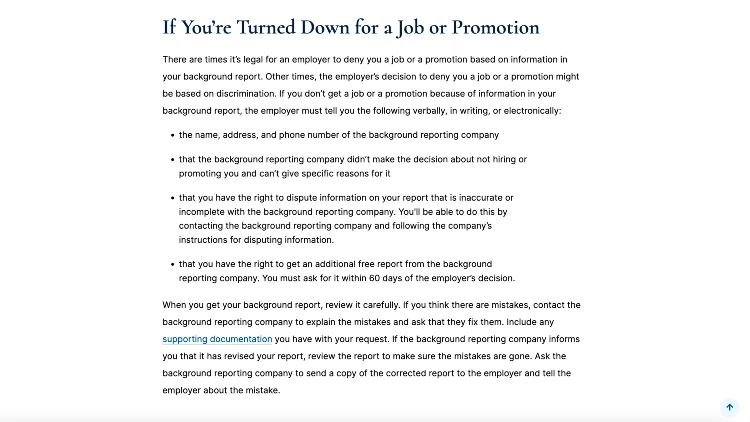
(Image: Federal Trade Commission6)
Alternatively, Michigan prohibits employers from considering certain pending court cases on background checks. While this information cannot be shown at all on a background check in Kentucky, it is available to employers to read in Michigan. However, employers in Michigan can only consider pending felonies, not misdemeanors, as a reason to disqualify a job candidate. That being said, the pending felony would have to be related to the job or other opportunity the person is being considered for.3 Furthermore, employers in Michigan cannot ask for information about any arrest that did not result in a conviction, which includes pending court cases.
In Texas, if a job position pays $75,000 or less as an annual salary, there are limits to criminal background checks. For instance, convictions that exceed 7 years old cannot be included in a pre-employment background check background for a promotion, or other hiring requirement.2 Also in Texas, a job applicant can deny a criminal conviction record if they have fulfilled their alternative sentence via deferred adjudication, which allows individuals to expunge their record.
On the other hand, in New Jersey, a background check will reveal all records of pending arrests and charges for violations of New Jersey laws, even if you have not yet had your day in court. The only way to remove arrests and any other criminal activity on your record from a background check would be to attempt to expunge your records. If pending records show up, your employer can ask about these and use them in their decision.
Unfortunately, not every state disallows background checks to include pending court cases. This can create disadvantages for individuals with pending criminal charges, especially if they will later be found innocent. Before “asking do pending court cases show up on a background check,” be sure to research the laws in your specific state to learn if you have any pending criminal charges or court cases that might appear.
Can Pending Charges in a Pre-Employment Background Check Prevent You From Getting a Job? What About During Other Background Checks, Such as During a Background Check for Housing?
While a pending criminal charge may appear in a criminal background check, it does not necessarily mean that it can be used to disqualify you from employment or housing opportunities. However, remember that the protections may differ from state to state.
There are also federal background check laws to protect job candidates regarding pre-employment background screening. If something uncovered in the pre-employment background check is the reason you were not hired or promoted, your employer must send you the background check report. Whether it was a misdemeanor, felony, or even a pending charge, they must explain why it prevents them from performing well at the specific job.
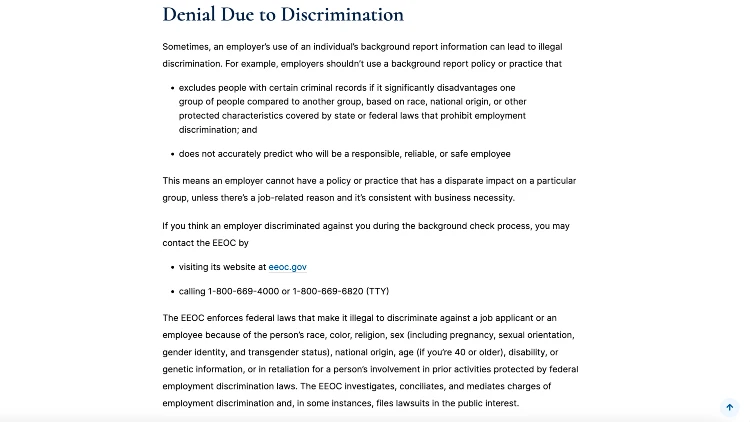
(Image: Federal Trade Commission6)
Furthermore, aside from explaining this verbally, the employer must also send the background check via a supporting document known as a “Summary of Rights,” which provides a summary of the screening as well as your rights. Essentially, this document outlines the information found by the third party that conducted the check, and also indicates how to contact them, in case their search revealed inaccurate information.
In some cases, whether or not pending charges can impact your employment chances is dependent on the state. While pending charges may appear on a criminal background check, this does not necessarily mean they can be used in a decision for employment hiring. In many states, as mentioned, the employer cannot ask for criminal history until later in the hiring process. This is true for both California and Massachusetts, which both have “ban the box” laws. These laws prohibit employers from screening on criminal history until later in the hiring process, rather than on the initial application. This way, pending charges on a background check show only at the final hiring step, if pending charges are allowed to be shown on background checks in the particular state.2
Check Your History Now
If you are still worried about what a background check might show due to any pending criminal charges, it may be wise to learn techniques for performing a records check on yourself. You can conduct this easily and quickly to obtain peace of mind when entering the job application or housing application process. This can help you feel confident when consenting to a background check. Many websites offer free products and different kinds of background screenings, but these aren’t always completely accurate because they may not access the latest court information that comes in frequently to databases.
Before asking, “Do pending court cases show up on a background check,” remember that each state has differing laws, some of which may protect your pending criminal charges from view, so make sure to research your specific jurisdiction.
References
1Klazema, M. Backgroundchecks.com. How Long Does It Take for a Pending Charge to Show up on a Background Check? 6 November 2019. 9 November 2021. Web. <https://www.backgroundchecks.com/blog/how-long-does-it-take-for-a-pending-charge-to-show-up-on-a-background-check>
2Guerin, L. Nolo. State Laws on Use of Arrests and Convictions in Employment. Nd. 9 November 2021. Web. <https://www.nolo.com/legal-encyclopedia/state-laws-use-arrests-convictions-employment.html>
3Akin, J. GoodHire. What Shows Up on a Background Check? 9 July 2021. 9 November 2021. Web. <https://www.goodhire.com/blog/what-shows-up-on-a-background-check/>
4Federal Trade Commission. 2018. Fair Credit Reporting Act. 8 November 2021. Web. <https://www.ftc.gov/system/files/documents/statutes/fair-credit-reporting-act/545a_fair-credit-reporting-act-0918.pdf>
5US Equal Employment Opportunity Commission. n.d. Pre-Employment Inquiries and Arrest & Conviction. 8 November 2021. Web. <https://www.eeoc.gov/pre-employment-inquiries-and-arrest-conviction>
6Federal Trade Commission. (2023, Aug). Employer Background Checks and Your Rights. Federal Trade Commission. Retrieved June 6, 2024, from <https://consumer.ftc.gov/articles/employer-background-checks-your-rights>
7U.S. Equal Employment Opportunity Commission. (2006, April 19). Section 15 Race and Color Discrimination. U.S. Equal Employment Opportunity Commission. Retrieved June 6, 2024, from <https://www.eeoc.gov/laws/guidance/section-15-race-and-color-discrimination#VIB2conviction>
